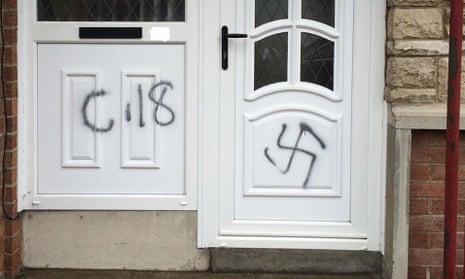Police recorded a 42% rise in complaints of hate incidents – more than 3,000 – in the weeks before and after the EU referendum, they revealed on Friday, while counter-terrorism officers investigated a series of packages containing white powder and racist messages sent to Muslim peer Lord Ahmed and others.
A number of packages discovered since Tuesday were being linked to a suspected hate campaign targeting mosques and some non-Muslim targets including the Bank of England, the Guardian has learned.
The white powder in the packages was harmless but may be meant to terrify those receiving it into believing it is a lethal biochemical weapon such as anthrax. Detectives are keeping an open mind as to what if any ideological motive is behind the packages. But the fact counter-terrorism officers are leading the investigation is a sign a hate motive is suspected.
The package sent to Lord Ahmed caused an evacuation of part of the Palace of Westminster on Thursday and was one of six such packages reported to police in the capital that day, it has been established.
The alert began in Sheffield, south Yorkshire, on Tuesday evening when several envelopes with white powder were found at a sorting office. By Thursday, police in London were called to a number of incidents where packages containing a white powder were found. In at least three cases, the white-powder packets were accompanied by hate messages.
The investigation is being led by the north-east counter-terrorism unit, which covers Yorkshire.
It comes at a time of rising reported hate crime in the aftermath of the campaign and vote that saw Britain elect to leave the European Union. The new figures released on Friday showed a large rise in reported incidents, averaging over 200 a day. Police said 3,076 hate crimes and incidents were reported to forces across the UK between 16 and 30 June; one week before and one week after the vote on 23 June.
Police chiefs said the rise amounted to a 42% increase in reporting week on week, and an increase of 915 reports compared to the same time last year. Privately some police chiefs fear the real figure could be higher, with past studies suggesting just one in four hate crimes are reported to police. The most offences, some 289, were recorded on 25 June, the first full day after the result of the vote in favour of Brexit was announced.
The counter-terrorism investigation into the sending of white powder to multiple targets comes amid growing concern about the effect the EU campaign and vote has had on hate crimes.
The Met police said it was first called at 9.30am on Thursday to a business address in east London that had received a package.
At 10.45am police were called to the Bank of England where chemical warfare specialists assessed a white powder as harmless that was sent in an envelope to the financial institution which has been mired in controversy over Brexit. At 12.30pm police were called by parliamentary officials after Lord Ahmed discovered the hate package sent to him.
By 12.45pm a third alert that day saw police attend an east London mosque, and by 2.45pm they were called to a north London Islamic centre and mosque, called Muslim Welfare House, in Finsbury Park, north London.
Its chief executive officer, Toufik Kacimi, said: “If a number of letters like this have been sent to different addresses, it is a campaign to spread hate and fear across different communities. It scared people, we had to evacuate.”
Details of the package sent to Muslim Welfare House match those of the one sent to Lord Ahmed, a prominent Muslim peer.
He told the Guardian: “It was intended to invoke fear and alarm. It was definitely part of a hate campaign.”
On the rise in hate attacks, police said the main type of offence seen during the 16-30 June period was “violence against the person, which is primarily harassment, common assault and other violence (verbal abuse, spitting and ‘barging’)”. The second and third most prevalent incidents were public order offences, followed by criminal damage.
Previous surveys have shown the vast majority of hate crime, some 85%, is race hate-related.
National Police Chiefs’ Council lead for hate crime, assistant chief constable Mark Hamilton, said:“We now have a clear indication of the increases in the reporting of hate crime nationally and can see that there has been a sharp rise in recent weeks. This is unacceptable and it undermines the diversity and tolerance we should instead be celebrating.
“Forces have been monitoring and managing hate crime more robustly since the attacks in Paris in 2015. We believe that greater awareness and confidence in the police response has contributed to this increase in reporting.”
Police believe just one in four incidents are reported to them. Thus 52,000 hate crimes were recorded by police last year but a national crime survey suggested the real annual figure was nearer 225,000.
Hamilton added: “Police forces across the UK have heightened their response to hate crimes over the last 10 days following these reports. We are working locally and nationally with partners to reassure communities and tackle offending. We will remain in close liaison with the CPS to ensure that the criminal justice system responds quickly and appropriately.
“Everyone has the right to feel safe and confident about who they are and should not be made to feel vulnerable or at risk. The police service has no tolerance for this type of abuse but we need to be made aware that these crimes are taking place so that we can investigate.”
Some forces, such as the Metropolitan police covering London, recorded sharp rises, as did Avon and Somerset and Greater Manchester. Others did not, suggesting a geographical variation.
